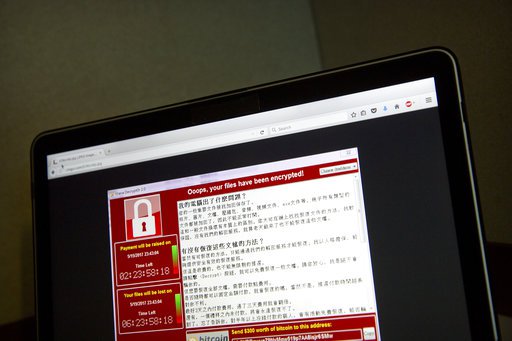
In this file photo on taken May 13, 2017, a screenshot of the warning screen from a purported ransomware attack, as captured by a computer user in Taiwan, is seen on a laptop in Beijing. (Picture from MARK SCHIEFELBEIN / AP)
MANILA, Philippines — The Department of Information and Communications Technology (DICT) on Wednesday said it needs additional personnel and legislative measures to enhance the country’s cybersecurity.
DICT Undersecretary Jeffry Dy made the statement after President Ferdinand Marcos Jr. approved the Philippine Digital Infrastructure Project (PDIP).
With the new project, 772 free Wi-Fi sites are set to be established in Mindanao — all of which are directly connected to DICT servers for better monitoring.
READ: 772 free Wi-Fi sites in Mindanao coming soon
Dy pointed out that the DICT’s mandate is not only limited to public or government-owned networks but even the entities that are connected to private internet service providers.
“For that reason, we still need additional professionals, not only in government but also in the private sector, to be able to sustain our drive to improve cybersecurity,” he said.
According to him, compared to countries with one certified professional for every 200 people, the Philippines has only one for every 2,000 or 3,000 — with the DICT only having 200 certified information systems security professionals.
“Are we at par with our regional counterparts? To give you an example, Singapore has only like 6 million people, but they are detecting approximately 18,000 attacks per year,” explained Dy.
“We are only detecting around 3,000 per year, but we are 118 million Filipinos,” he noted.
“So, I think we need to improve this by, for example, having a cybersecurity law that will mandate even the private sector to report to us, if there is a cybersecurity incident,” he said.
Nevertheless, Dy observed that relatively, the country’s cybersecurity has grown.
“We are significantly better now. Our detection mechanisms are there. Our protective systems are there and you will notice that we are now sharing information also with our allies,” said Dy.
“Ibig sabihin, hindi na ito (this means, it’s no longer just) one-way communication with our allies. We are also sharing with them certain tactics, techniques and procedures being employed by hackers of international origin,” he emphasized.
READ: NATO expert: ‘Chinese cyberattacks likely to destabilize Filipino society’
Dy added there have already been around 2,900 early detections of hacking attempts against government agencies, including the Department of Agriculture and the Philippine Coast Guard.